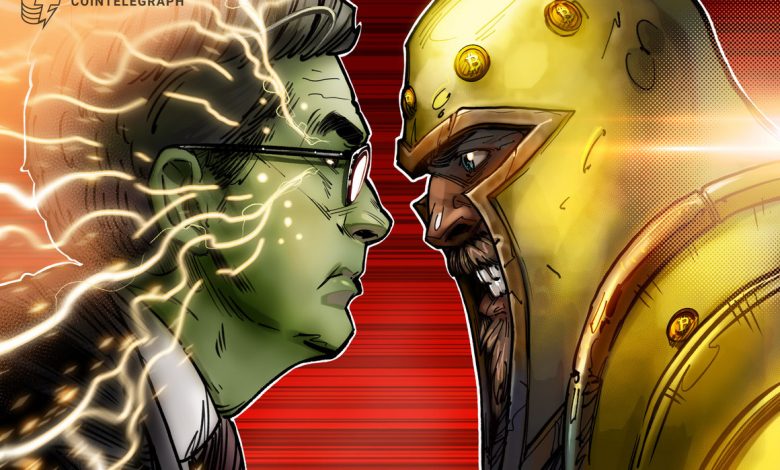Inflation is killing us; cryptocurrency alone cannot beat it

Very like a pandemic, inflation has unfold all through the world, clouding the long run with darkish uncertainty.
Disagreement over easy methods to finest handle hovering costs in the UK practically prompted its financial system to break down and subsequently led to the resignation of Prime Minister Liz Truss after simply 44 days in workplace. At the moment, at the very least 10 rising economies are hyperinflationary, with extra anticipated to observe. And the Federal Open Market Committee (FOMC), the a part of the U.S. Federal Reserve accountable for holding costs secure, simply introduced increased rate of interest hikes within the midst of a return to constructive gross home product — signaling persevering with inflation troubles forward.
The worldwide battle to cut back inflation is tangible proof that yesterday’s central financial institution instruments are insufficient for right this moment’s financial issues. However hope for a brighter, sustainable tomorrow may be present in a expertise least anticipated by policymakers: blockchains.
Because the world’s de facto reserve forex, all nations depend on U.S. {dollars} for commerce. When occasions are good, that appears to go well with everybody simply tremendous. However throughout occasions of excessive inflation, the buying energy of {dollars} falls sharply, forcing different nations to purchase extra {dollars} to keep up stability. And but, durations of excessive home inflation are precisely what compel the Fed to cut back greenback liquidity by way of rate of interest hikes — successfully encumbering worldwide dollar-buying. This dilemma between easing home inflation pressures whereas assembly the liquidity wants of the world known as the Triffin dilemma, and it arises each time a credit-based nationwide forex, just like the U.S. greenback, is used as a worldwide reserve.
Associated: Jerome Powell is prolonging our financial agony
In sensible phrases, Triffin-impaired financial coverage causes monetary crises originating in superior developed nations to quickly unfold internationally. (The Triffin Dilemma doesn’t spark excessive inflation in superior economies; as a substitute, it acts as an accelerant, like gasoline, that spreads excessive inflation in all places, quickly.) These crises disproportionately hurt the poor, dramatically erasing lots of the developments in fairness, financial safety, and poverty discount made throughout increase years, invariably inflicting international development to finish in international bust. This repeating boom-bust cycle, the place nice steps backward are made after each leap ahead, highlights the vital must reform and modernize our worldwide financial system.
Curiously, we now have identified easy methods to clear up Triffin-related inflationary contagion lengthy earlier than Robert Triffin first recognized the phenomenon within the Nineteen Sixties. On the Bretton Woods Convention following World Struggle II, John Maynard Keynes defined that Melancholy-era international inflation may very well be successfully managed by avoiding the usage of nationwide currencies for worldwide commerce and, as a substitute, getting nations to agree to make use of a value-stable international reserve. Although Keynes’ proposal was by no means applied, the concept was effectively forward of its time.
As practically eight a long time have handed since Bretton Woods, let’s unpack what this implies in 2022.
Again in 2009, within the midst of the final monetary disaster, a number of nations referred to as for Keynesian-like reforms, insisting on the usage of the Worldwide Financial Fund’s Particular Drawing Rights — primarily, items of account backed by a basket of currencies — for use extra broadly as a worldwide reserve. 13 years later, we are able to confidently say these proposals didn’t go anyplace. We nonetheless depend on U.S. {dollars} for worldwide commerce, and there seems to be little political will to alter the established order. Efficient reform of the monetary system, it appears, will not be doable by way of current coverage channels.

However one thing new and disruptive has been brewing over the previous few years. The arrival of blockchains has made creating new, counterfeit-resistant digital currencies a simple job, and a rising motion in peer-driven, non-central-bank finance (decentralized finance, or DeFi) has given rise to a worldwide neighborhood of individuals keen to experiment with privately issued digital currencies.
In response to the rising use of those different currencies, practically all the world’s central banks are investigating the issuance of central financial institution digital currencies, or CBDCs. These are public digital {dollars} and euro and yuan powered by blockchains, applied with the intention of rendering privately issued cryptocurrencies out of date.
Nonetheless, latest analysis by Linda Schilling and others revealed that CBDCs will doubtless fail over time. Particularly, there exists a CBDC trilemma, the place CBDCs can not concurrently be financially secure, value secure, and environment friendly. In different phrases, CBDCs don’t clear up any of the issues we now have with current currencies, but they create doubtlessly catastrophic new issues beneath the guise of forward-thinking innovation.
A real answer, nonetheless, could also be nearby. The collision of right this moment’s extraordinary situations, of latest applied sciences and crises and communities, means it has by no means been simpler for a non-public occasion to situation a scalable, non-inflationary reserve forex to enhance the U.S. greenback. Not an anti-dollar per se, however a value-stable cryptocurrency, tailored to cut back inflation, and designed particularly for cross-border settlements — successfully fixing the Triffin dilemma and assuaging inflation ache for billions of individuals.
To be honest, some have already tried this. Ripple’s XRP (XRP) token was as soon as touted as a doable international reserve, and a few Bitcoin (BTC) lovers assist a complete transition from fiat currencies to Bitcoin. Nonetheless, in a Federal Reserve Financial institution of Philadelphia working paper, researchers showed that fiduciary cryptocurrencies — tokens backed solely by consumer belief — could also be hyperinflationary over time if governments don’t step in to restrict the creation of competing cryptocurrencies. (The thought is that, if folks maintain making cryptocurrencies, at some point there shall be so many cryptocurrencies in circulation that each one cryptocurrencies will ultimately develop into nugatory.)
Associated: Mass adoption shall be horrible for crypto
A very viable international reserve forex will doubtless have to interrupt from this fiduciary custom and be anchored to a secure worth.
However none of those considerations appear to be holding software program builders from experimenting with DeFi. There are cryptocurrencies designed for quite a lot of consumer wants, from privacy-focused tokens used largely for darknet market transactions to network-specific currencies used to energy transaction verifications.
Most of these restricted sensible use instances may be an necessary distinction for a viable reserve cryptocurrency. The purpose is to not compete with the greenback, however to present different nations an alternative choice to the greenback in periods of heightened volatility — in essence, an anti-inflation cryptocurrency to assist shift the world away from limitless boom-bust cycles and in the direction of regular, sustainable international development.
At some point, a few years from now, folks will look again on what we did to forestall an impending international disaster. Had been we content material to fiddle with rates of interest because the world descended into chaos, or did we decide to daring modernization throughout a time of nice uncertainty? No matter historical past remembers of us, the query our actions right this moment will reply is that this: If we’re certainly residing beneath a damaged system the place our greatest coverage instruments can not save us from imminent financial failure, why are we not making an attempt one thing new and completely different?
It’s time for us to take brave, decisive motion and write a brand new Bretton Woods Settlement to safeguard the world’s future — however this time, in Solidity.
This text is for common data functions and isn’t supposed to be and shouldn’t be taken as authorized or funding recommendation. The views, ideas, and opinions expressed listed here are the creator’s alone and don’t essentially mirror or signify the views and opinions of Cointelegraph.





